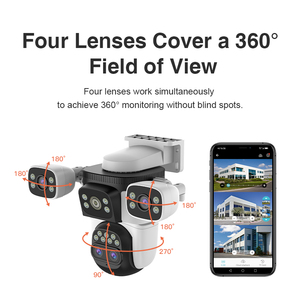Introduction to IP Camera Type
In the ever-evolving realm of surveillance technology, IP camera type has emerged as a pivotal component for both residential and commercial security solutions. Unlike traditional analog cameras, IP cameras utilize Internet Protocol (IP) to transmit data, enabling users to access and manage their surveillance feeds remotely. This innovative technology offers unparalleled flexibility, scalability, and image clarity, making it increasingly popular among security-conscious individuals and enterprises alike.
Types of IP Camera Type
Understanding the various types of IP camera type is essential for selecting the right surveillance solution for your needs. Here are the primary categories:
- Dome Cameras: These are discreet and often used in indoor environments. Their spherical design makes them less noticeable while providing 360-degree coverage.
- Bullet Cameras: Known for their long-range capabilities, bullet cameras are ideal for outdoor applications and can capture detailed images from a distance.
- PTZ Cameras: PTZ (Pan-Tilt-Zoom) cameras allow for remote control and can pan across an area, tilt up or down, and zoom in on specific subjects, making them highly versatile.
- Wireless IP Cameras: These cameras offer the convenience of installation without the hassle of wires, ideal for locations where cabling is impractical.
- Infrared Night Vision Cameras: Equipped with IR technology, these cameras can capture clear images in low-light conditions, ensuring security is maintained around the clock.
Applications of IP Camera Type
The versatility of IP camera type makes it suitable for a wide range of applications. Some of the most common uses include:
- Home Security: Many homeowners opt for IP cameras to monitor their properties, deterring potential intruders and providing peace of mind.
- Business Surveillance: Companies deploy IP cameras to oversee premises, ensuring the safety of employees, assets, and customers.
- Remote Monitoring: With the advent of mobile apps, IP cameras enable users to monitor their properties from anywhere in the world.
- Traffic Monitoring: Municipalities use IP cameras to oversee traffic flow, manage congestion, and enhance public safety.
- Healthcare Facilities: In hospitals and clinics, IP cameras help maintain safety and monitor the well-being of patients and staff.
Advantages of IP Camera Type
Investing in the right IP camera type brings numerous advantages, making it a worthwhile consideration for security enhancement:
- High-Quality Imaging: With resolutions often reaching 4K, IP cameras provide superior image clarity, which is crucial for identifying faces and objects significantly.
- Scalability: IP camera systems can easily expand to accommodate additional cameras as security needs grow without the complexity associated with analog systems.
- Remote Access and Control: Enjoy the convenience of accessing camera feeds through smartphones, tablets, or computers, allowing for real-time monitoring.
- Advanced Features: Many IP cameras come equipped with features such as motion detection, two-way audio, and analytics options that enhance user experience.
- Cost-Effective in the Long Run: Although the initial investment may be higher than analog systems, the benefits of reduced installation and maintenance make them a cost-effective choice over time.


























































































































































































































